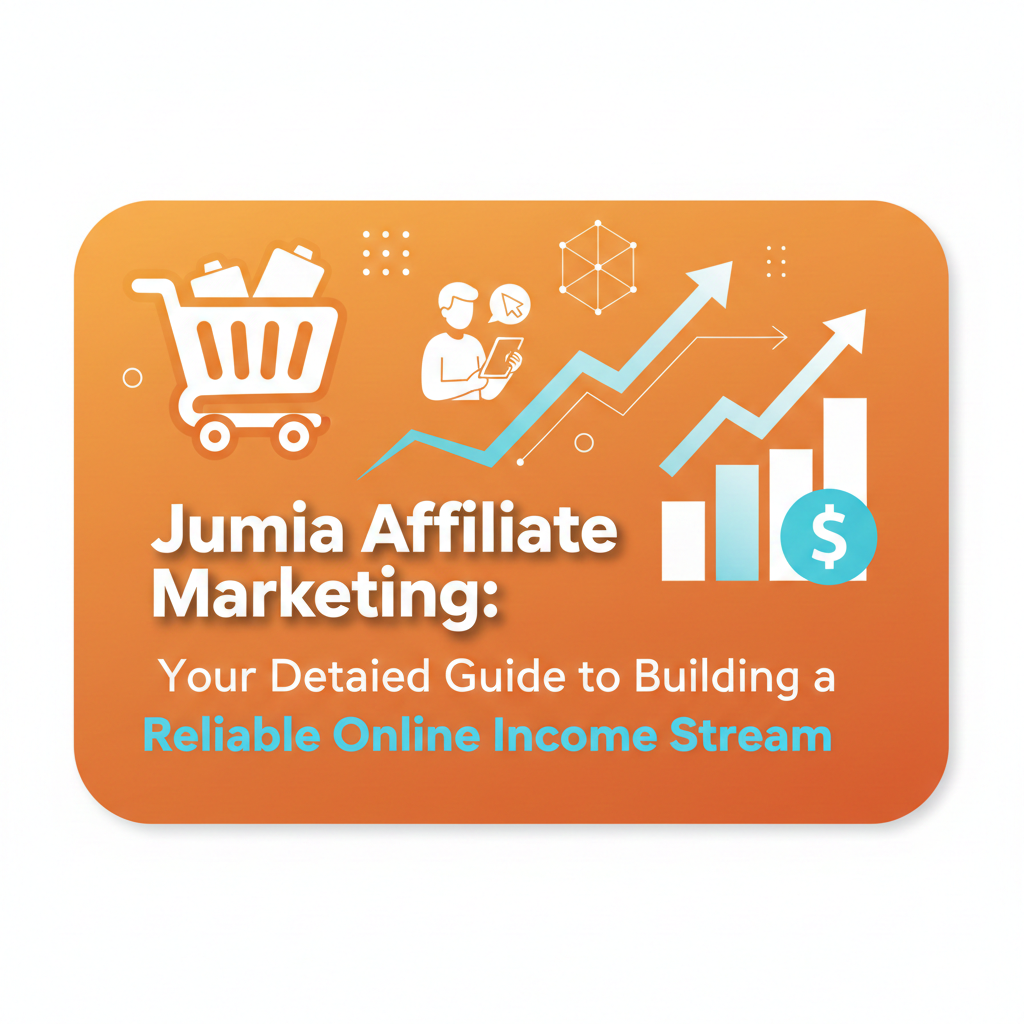Welcome! If you are interested in transforming your online presence be it a blog, a social media channel, or even a popular WhatsApp group into a consistent income source, you’ve landed in the right place.
The rise of e-commerce across Africa, led by giants like Jumia, has created unparalleled opportunities for individuals like you to earn through affiliate marketing. This isn’t just about sharing links; it’s about strategically connecting Jumia’s vast catalog of products with an audience that trusts your recommendations.
I’m here to walk you through the Jumia Affiliate Program, breaking down the application, the strategy, the tools, and, most importantly, the payout process, in simple, comprehensive detail.
Let’s get started on building your reliable online income stream with Jumia.
Part 1: Understanding the Foundation of Jumia Affiliate Marketing
Before diving into the sign-up, it’s vital to fully grasp what affiliate marketing is and why partnering with Jumia is a smart move.
1. The Affiliate Principle Explained
At its core, affiliate marketing is a performance based system. You, the affiliate, are rewarded (paid a commission) for every customer you bring to Jumia who completes a purchase.
The process is straightforward:
- You Provide a Link: You share your unique tracking link for a specific Jumia product (or even just the Jumia homepage).
- Jumia Tracks the Action: When a user clicks your link, a small file called a “cookie” is dropped onto their browser, linking that user’s subsequent purchases back to your affiliate ID.
- The Sale is Confirmed: The customer buys an item, and the order is successfully delivered and not returned.
- You Earn: Jumia acknowledges your role in the sale and deposits your commission into your account.
2. Why Jumia is an Excellent Partner
For anyone targeting the African market, Jumia offers distinct advantages that translate into higher conversion rates for you:
- Massive Trust and Brand Recognition: Jumia is a household name across its operating countries. You don’t need to spend time establishing the credibility of the store; you can focus entirely on selling the product.
- Extremely Wide Product Range: From fast-moving consumer goods (FMCG) like groceries and cosmetics to high-value items like electronics and home appliances, Jumia’s marketplace means you can always find relevant products, regardless of your niche.
- Targeted Programs: Jumia often runs distinct programs, like the standard Affiliate Program (ideal for blog and website owners) and the Key Opinion Leader (KOL) Program (often tailored for influencers and high-traffic social media users). Both share the same goal: rewarding you for sales.
Part 2: The Step-by-Step Application and Approval Process
Getting signed up is easy, but attention to detail in your application helps ensure quick approval.
Step 1: Access the Official Platform
Navigate to the official Jumia Affiliate registration page. Ensure you are on the correct, secure Jumia domain for affiliates (it’s often branded under Jumia’s main site or a dedicated affiliate portal).
Step 2: Complete the Registration Form
You will be required to provide detailed information to verify your identity and your promotional capacity:
- Personal Information: Provide your legal name, email address, phone number, and country of residence. This information must be accurate for later payment verification.
- Account Details: You’ll create your login credentials (username and password).
- Promotion Channel Details (Crucial): Jumia needs to know where you will promote their products.
- List your main website URL, blog URL, or the links to your primary social media channels (YouTube, Instagram, Facebook Page, TikTok).
- If you primarily use closed groups (like WhatsApp or Telegram), describe your audience size and engagement clearly in the description field.
- Traffic and Niche Description: Briefly but clearly explain your niche (e.g., “Budget smartphone reviews for university students”) and how you intend to drive traffic (e.g., “In-depth reviews and comparison videos uploaded weekly, linking to product pages”).
Step 3: Awaiting Approval and Adherence to Rules
Once submitted, Jumia’s team will review your application. This can take anywhere from a few days to a week.
Note on Requirements: Jumia looks for quality and professionalism. Ensure your platform:
- Is Active: Has recent, relevant content.
- Is Professional: Avoid illegal, spammy, or harmful content.
- Respects Branding: You must not use Jumia’s official trademarks (like the Jumia name or logo) in your own domain name or social media handles without explicit permission. Direct, unethical Pay-Per-Click (PPC) advertising to Jumia links is also usually prohibited.
Once approved, you will receive an email and gain access to your Affiliate Dashboard.
Part 3: Mastering the Affiliate Dashboard and Tools
The dashboard is your cockpit for earning. You must learn how to generate links and monitor performance effectively.
1. Generating Your Tracking Links
The most important tool is the Link Builder. This tool is essential because it embeds your unique Affiliate ID into any Jumia URL.
- Process:
- Browse Jumia and find the exact product, category page, or promotional banner you want to share.
- Copy the URL from your web browser.
- Paste this URL into the Link Builder tool within your dashboard.
- The tool generates a shortened or full tracking URL that you will use in your content.
2. Understanding the Tracking Cookie and Conversion Window
Jumia uses tracking technology that works heavily in your favor:
- The Cookie Duration: The cookie, which links the visitor to your ID, typically lasts for seven days. This is a massive advantage.
- The Power of the Cookie: If a visitor clicks your link for a $10 phone case, but then returns to Jumia three days later (within the cookie window) and buys a $500 television, you receive the commission for the $500 television! You get credit for the customer’s entire shopping cart during that window, not just the single item you promoted.
- Monitoring Performance: Your dashboard will provide real-time (or near real-time) statistics on:
- Click-Through Rate (CTR): How many people are clicking your links.
- Conversion Rate: The percentage of clicks that resulted in a sale.
- Sales Value and Commission: The exact monetary value of the sales attributed to you.
Part 4: High-Impact Promotion Strategies That Convert
Simply posting raw links is ineffective. You need to create compelling content that drives clicks and builds confidence.
1. Focus on Solving Problems, Not Just Selling
Your content should address a need or desire your audience has. Instead of saying “Buy this phone,” try “Is this the best budget phone for your child’s virtual schooling?”
| Strategy | Goal | Content Example |
| In-Depth Reviews | Build trust through authenticity and detailed examination. | A YouTube video showing the unboxing, performance, and key flaws of a Jumia laptop. |
| Comparison Guides | Help the user make a decisive choice between options. | “Jumia’s Top 3 Air Fryers: Which One Is Best for Your Kitchen?” (Linking to all three products). |
| Seasonal & Sales Focus | Leverage the high-traffic events Jumia organizes. | Creating a blog post titled “Must-Grab Deals from the Jumia Black Friday Sales Event.” |
| Tutorials and How-Tos | Show the utility of a product purchased from Jumia. | A step-by-step guide on setting up a smart home gadget bought on Jumia. |
2. Strategic Link Placement and Disclosure
- Deep Linking: Always link directly to the product or category that is most relevant to your content. If you are reviewing a phone, link to that specific phone’s page.
- Call-to-Action (CTA): Use clear, compelling language to encourage clicks, such as “Click here to check the current price,” or “View more colors on Jumia.”
- Mandatory Disclosure: Always disclose that you are using an affiliate link. This builds transparency and trust, which is the most valuable asset in affiliate marketing. A simple statement suffices: “Note: This post contains affiliate links. If you click and make a purchase, I may earn a small commission at no extra cost to you.”
Part 5: Commission Structure and Getting Paid
Understanding how and when you get paid is crucial for planning your finances.
1. Jumia Commission Structure
Commissions are structured based on product categories. Typically, categories with higher profit margins for Jumia offer higher commission rates for you.
- Higher Rates (e.g., 8% – 12%): Categories like Fashion, Accessories, Beauty, and Home Goods. These items are often purchased repeatedly.
- Lower Rates (e.g., 4% – 6%): Categories like Electronics, Mobile Phones, and Computing. While the rate is lower, the average order value is significantly higher, often leading to a larger total commission per sale.
Always refer to the latest commission table provided in your Jumia dashboard, as rates are subject to change based on market conditions or promotions.
2. The Payout Process
- Confirmation Window: Commissions are not paid out immediately upon purchase. They enter a “pending” status until the order is successfully delivered, the return period has expired, and Jumia confirms the sale is final. This process can take several weeks.
- Payment Threshold: You must reach a minimum payout amount (this varies by country, but is often equivalent to around $50 USD or $100 USD) before a payment is triggered.
- Payment Frequency: Payments are typically processed monthly for all confirmed commissions that exceed the minimum threshold.
- Payment Method: You will be required to provide accurate local bank account details in your dashboard. Jumia processes the payout via direct bank transfer.
Conclusion: Consistency is the Key to Jumia Affiliate Success
The Jumia Affiliate Program offers a realistic and powerful way to monetize your audience across Africa. It’s not a get-rich-quick scheme; it is a business model built on value and consistency.
Focus on creating helpful, honest, and high-quality content that genuinely serves your audience’s needs. Use your dashboard to see what is converting, double down on that strategy, and remember the power of the 7-day cookie.
With patience and consistent effort, you can transform your influence into a steady, reliable stream of passive income.
Discover more from PratsDigital
Subscribe to get the latest posts sent to your email.

